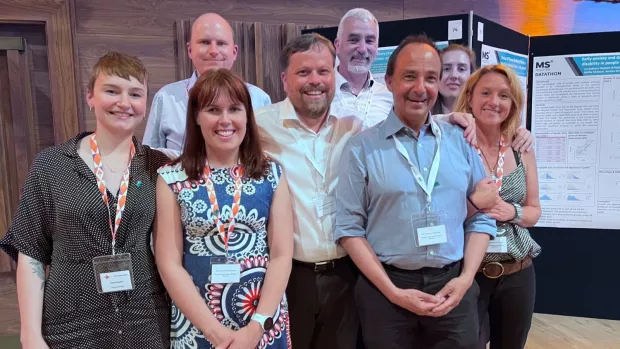
Knowledge is power: How my daughter’s benefitted from the UK MS Register
Katherine Bliss chats to her daughter Ellie Gent about how the Register has been an important part of her journey with MS.
My daughter Ellie was diagnosed with relapsing remitting MS in 2016, aged 29. Soon afterwards she joined the UK MS Register, at the suggestion of her MS nurse.
The Register can help to answer big questions like how different types of MS affect different people. And how where you live might affect the treatment you receive. Ellie told me:
"I feel it’s important to help researchers understand the condition. So I complete the online questionnaires whenever they ask me to. I’ve also chosen to let them access my NHS records, so they can combine this with my answers. And, with huge amounts of data from other contributors they can get insights into MS across the UK. Initially I was just hoping they'd find potential ways to reduce the risk of relapses."
Ellie’s diagnosis changed to secondary progressive MS
This year, a routine MRI scan changed her diagnosis to secondary progressive. Ellie says:
"I'm now even more keen to support the Register. Data collected could help researchers understand more about progressive MS, and predict the effects of treatments. I still follow the news about new treatments for relapsing remitting MS. I’m hoping especially for one that can prevent people becoming progressive. But for me the damage is done. My own best hope lies in treatments that can slow things down. This includes the disease modifying therapy siponimod (Mayzent), which research has shown to slow down progression by up to 37% compared to a placebo."
Before siponimod, Ellie had been taking dimethyl fumarate (Tecfidera) which can limit inflammation that happens with an MS relapse.
Changing her DMT to siponimod
There was a worrying delay while the local NHS considered their approval, but after about three months Ellie finally received a prescription for siponimod.
"I struggled with the switch from Tecfidera to siponimod for a few days, while the weird side effects settled down. But after three weeks I'm now finding it ok - and of course I’m hoping it will work for me. It doesn't for everyone, sadly. I hope it gets easier for people to access drugs like siponimod. And hopefully even better ones in future will be available to everyone who can benefit. The best way to achieve this would be for everyone to sign up to the Register and share their data, so I really hope people do.
Tracking her data helps Ellie set goals
Ellie says: "But it's not just about research: I've found it really useful to be able to track my symptoms over time. As they progress slowly I often think there's been no change. But reading back through the Register I can see how much I've progressed since my initial diagnosis.
And while I understand that some people do prefer not to know, I find that knowledge empowering. It helps me set my goals more accurately, and so achieve more in the end."




